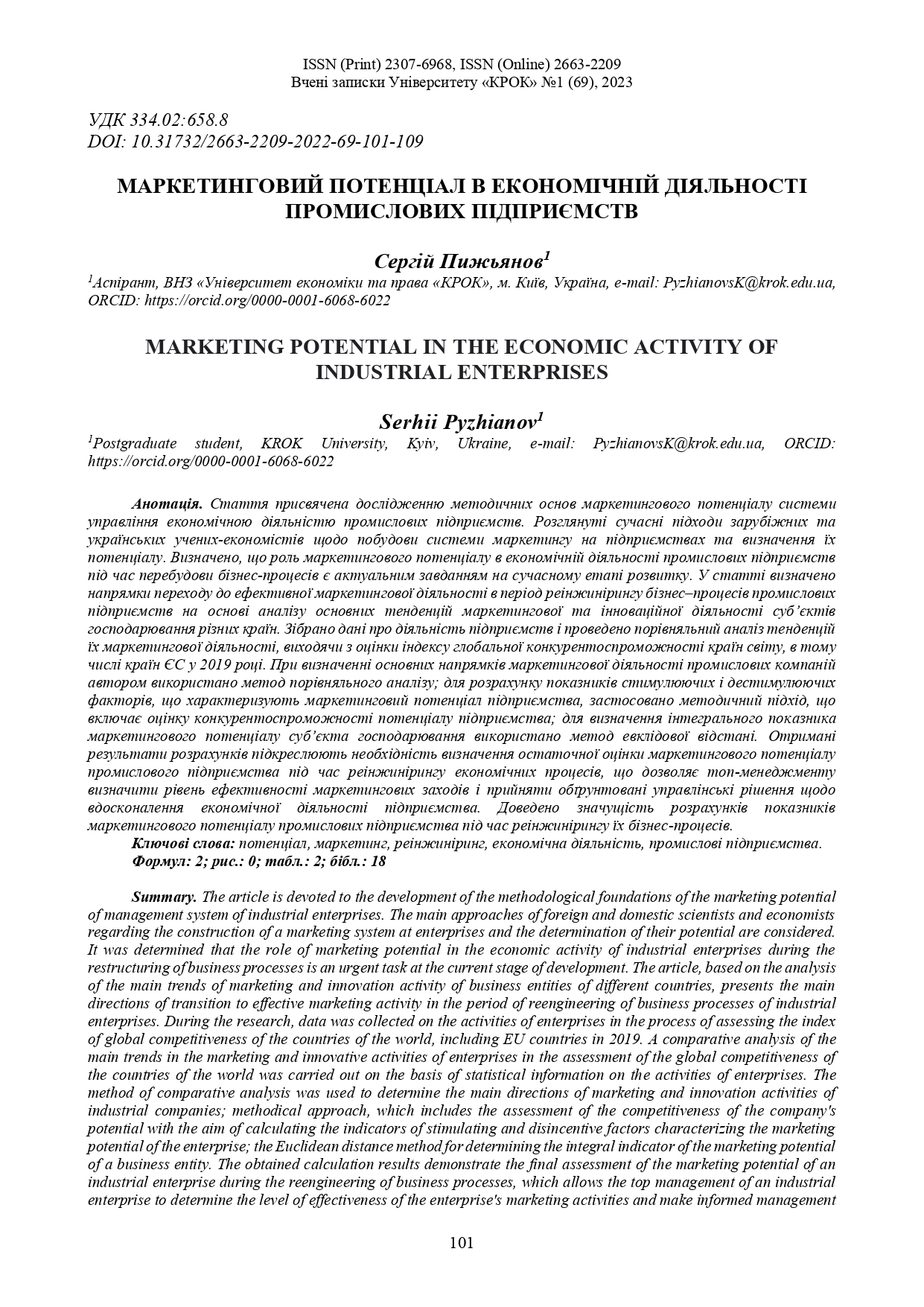MARKETING POTENTIAL IN THE ECONOMIC ACTIVITY OF INDUSTRIAL ENTERPRISES
DOI:
https://doi.org/10.31732/2663-2209-2022-69-101-109Keywords:
potential, marketing, reengineering, business processes, industrial enterprisesAbstract
The article is devoted to the development of the methodological foundations of the marketing potential of management system of industrial enterprises. The main approaches of foreign and domestic scientists and economists regarding the construction of a marketing system at enterprises and the determination of their potential are considered. It was determined that the role of marketing potential in the economic activity of industrial enterprises during the restructuring of business processes is an urgent task at the current stage of development. The article, based on the analysis of the main trends of marketing and innovation activity of business entities of different countries, presents the main directions of transition to effective marketing activity in the period of reengineering of business processes of industrial enterprises. During the research, data was collected on the activities of enterprises in the process of assessing the index of global competitiveness of the countries of the world, including EU countries in 2019. A comparative analysis of the main trends in the marketing and innovative activities of enterprises in the assessment of the global competitiveness of the countries of the world was carried out on the basis of statistical information on the activities of enterprises. The method of comparative analysis was used to determine the main directions of marketing and innovation activities of industrial companies; methodical approach, which includes the assessment of the competitiveness of the company's potential with the aim of calculating the indicators of stimulating and disincentive factors characterizing the marketing potential of the enterprise; the Euclidean distance method for determining the integral indicator of the marketing potential of a business entity. The obtained calculation results demonstrate the final assessment of the marketing potential of an industrial enterprise during the reengineering of business processes, which allows the top management of an industrial enterprise to determine the level of effectiveness of the enterprise's marketing activities and make informed management decisions. The significance of the calculations of indicators of the marketing potential of industrial enterprises during the reengineering of their business processes was formed.
Downloads
References
Офіційний сайт Державної служби статистики України. URL: http://www.ukrstat.gov.ua (дата звернення 18.12.2022)
Notta O., Vlachvei A. Changes in marketing changes in marketing strategies during recession. Procedia Economics and Finance. 2015. Vol. 24. Рр. 485–490.
Mu J., Bao Y.K., Sekhon T., Qi J., Love E. Outside in marketing capability and firm performance. Industrial Marketing Management. 2018
Papadas K.K., Avlonitis G.J., Carrigan M., Piha L. The interplay of strategic and internal green marketing orientation on competitive advantage. Journal of Business Research. 2019. Vol. 104. Issue C, Pр. 632–643.
Kraus K., Håkansson H., Lind J. The marketing accounting interface – problems and opportunities. Industrial Marketing Management. 2015. Vol. 46. Pр. 3–10.
Giovanardi M., Lucarelli A. Sailing through marketing: A critical assessment of spatiality in marketing literature. Journal of Business Research. 2018. Vol. 82. Pр. 149–159.
Алькема В.Г. Реінжиніринг бізнес-процесів логістичного комплексу компанії. Вчені записки Університету «КРОК». №2 (54). 2019. С. 126-136.
Taraniuk L.M., Kobyzskyi D.S., Taraniuk K.V., Dimitrova V. Personnel aspects of marketing activity reengineering at the industrial enterprises. Innovative Marketing. 2018. Vol. 14. №2. Pр. 26–34. DOI: http://dx.doi.org/10.21511/im.14(2).2018.03
Mihus I., Denysenko M., Rumyk I., Pletenetska S., Laptiev M., Kupriichuk V. Methodology of corporate financial diagnostics in the period of a crisis. AD ALTA: journal of interdisciplinary research. 2021. Vol. 11. Iss. 1, Spesial Issue XV. Pp. 52-55.
Пилипенко О.О., Румик І.І. Управління фінансово-господарською діяльністю інтегрованих підприємств на інноваційній основі. Вчені записки Університету «КРОК». №2 (62). Київ, 2021. С. 166-175. URL: http://snku.krok.edu.ua/vcheni-zapiski-universitetu-krok/article/view/419/448
Румик І.І. Розвиток фінансового сектору: стан, фінансова інклюзія, візія та стратегія дій. Соціально-економічні та правові аспекти розвитку суспільства : колективна монографія. Київ: ВНЗ «Університет економіки та права «КРОК», 2020. С. 132-145.
Bendle N.T., Wang X.S. Marketing accounts. International Journal of Research in Marketing. 2017. Vol. 34. Pр. 604–621.
Mokyr J. The industrial revolution and the Netherlands: Why did it not happen? De Economist. 2000. Vol. 4. Issue 148. Pр. 503–520.
Global Innovation Index 2019. Global Innovation Index: веб–сайт. URL: https://www.globalinnovationindex.org/analysis–indicator
Melnyk L., Taraniuk L., Kozmenko O., Sineviciene L. Influence of the minimum salary level increase on the business entities activity in the context of transition to the sustainable development. Problems and Perspectives in Management. 2017. Vol. 15. Issue 1. Рр. 72–79.
Краснокутська Н.С., Бубенець І.Г. Підприємницький потенціал як фактор розвитку торговельних підприємств: монографія. Харків, 2015. 198 с.
Васильченко Л.С., Коляденко О.Л., Стручок О.В. Вплив логістики на ефективність функціонування маркетингового комунікаційного середовища підприємства. Актуальні проблеми економіки. №6 (228). 2020. С. 51-57
Герасимчук З.В., Морохова В.О., Бойко О.В. Маркетингова політика машинобудівних підприємств на ринку інвестиційних товарів : монографія. Луцьк : Надстир’я, 2008. 200 с.

Downloads
Published
How to Cite
Issue
Section
License

This work is licensed under a Creative Commons Attribution-NonCommercial 4.0 International License.

